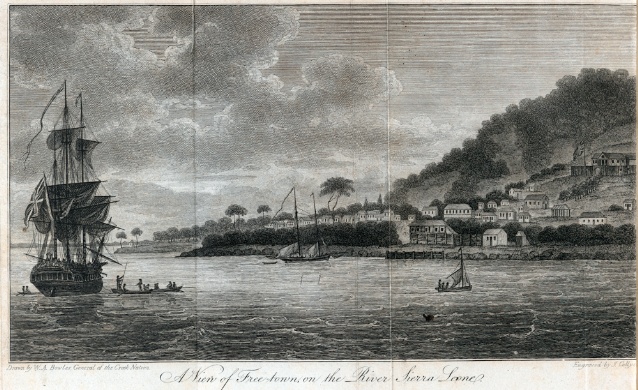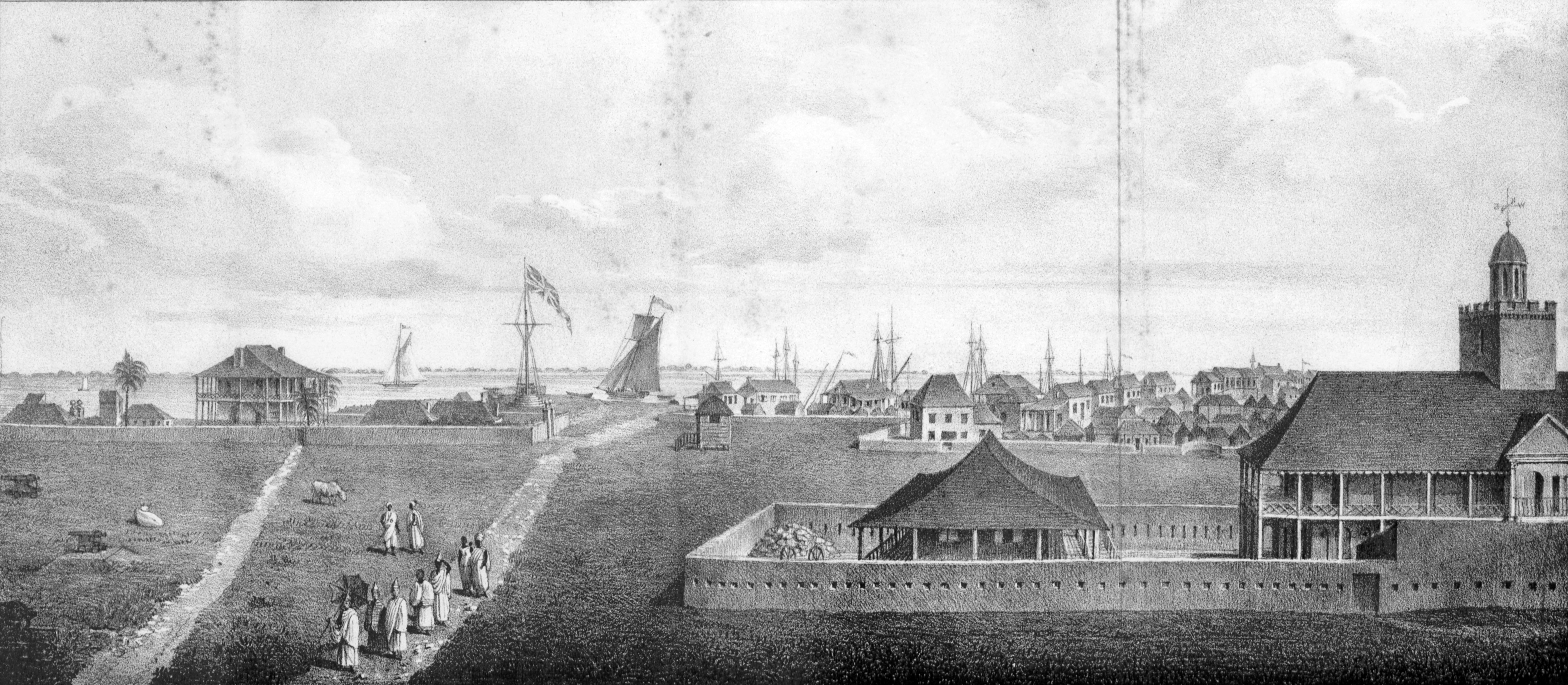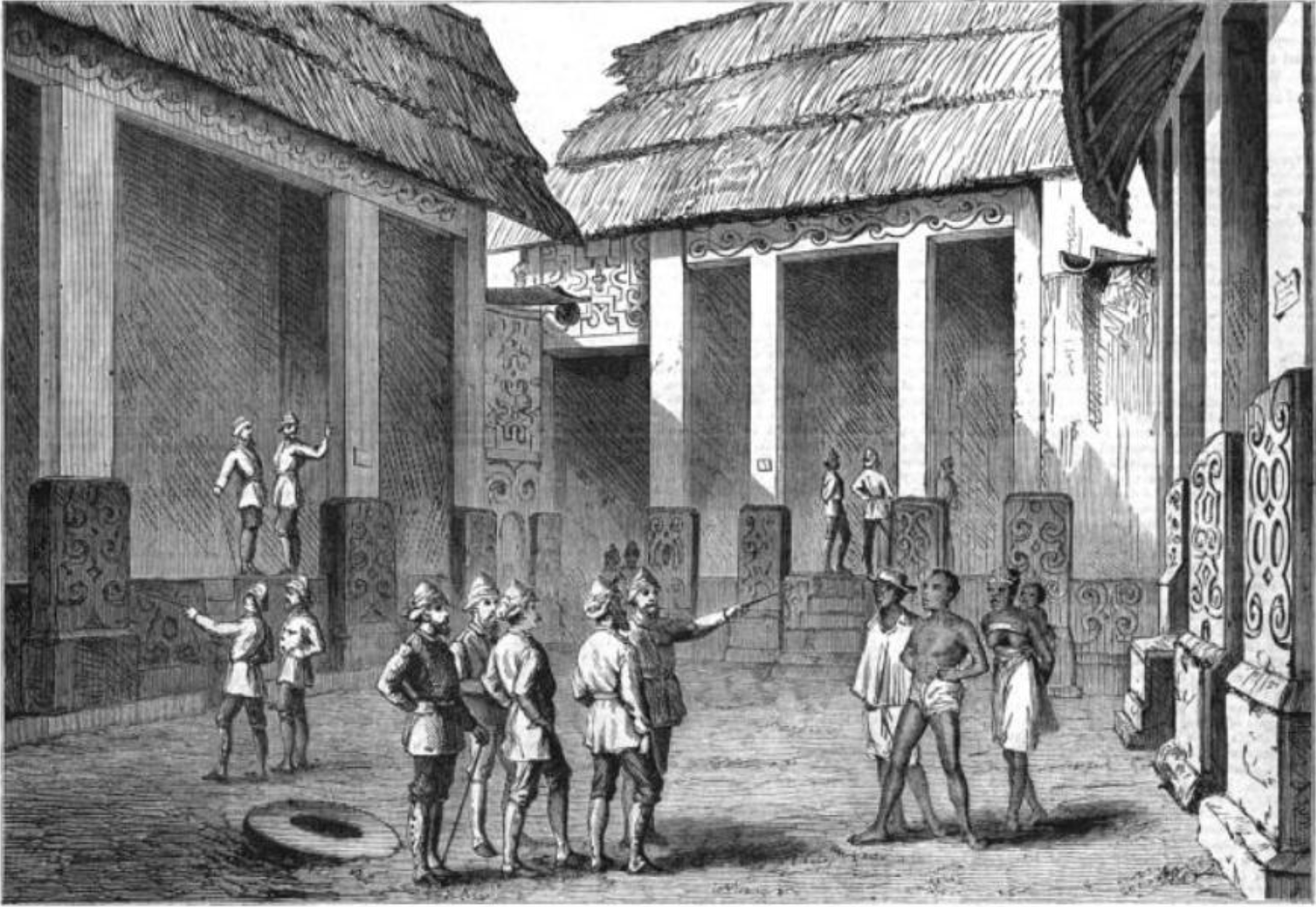|
Samuel Rowe (colonial Administrator)
Sir Samuel Rowe (23 March 1835 – 28 August 1888) was a British doctor and colonial administrator who was twice governor of Sierra Leone, and also served as administrator of the Gambia, governor of the Gold Coast and governor-general of the West Africa settlements. He was known for his ability to form pro-British relationships with the local people. He was in favour of a vigorous programme of expansion from the coast into the interior in response to French activity in the Sahel region, at times in opposition to Colonial Office policy. Early years Samuel Rowe was born on 23 March 1835 at Macclesfield, Cheshire. He was the youngest son of George Hambly Rowe, a Wesleyan minister, and Lydia Ramshall of London. He was educated at private schools, then studied medicine under Joseph Denton of Leicester and others. He qualified as a doctor in 1856. He was appointed to the army medical staff in 1862 and assigned to Lagos in West Africa. Rowe married Susannah, daughter of William Gat ... [...More Info...] [...Related Items...] OR: [Wikipedia] [Google] [Baidu] |
Order Of St Michael And St George
The Most Distinguished Order of Saint Michael and Saint George is a British order of chivalry founded on 28 April 1818 by George IV, George IV, Prince of Wales, while he was acting as prince regent for his father, George III, King George III. It is named in honour of two military saints, Michael (archangel), Michael and Saint George, George. The Order of St Michael and St George was originally awarded to those holding commands or high position in the Mediterranean Sea, Mediterranean territories acquired in the Napoleonic Wars, and was subsequently extended to holders of similar office or position in other territories of the British Empire. It is at present awarded to men and women who hold high office or who render extraordinary or important non-military service to the United Kingdom in a foreign country, and can also be conferred for important or loyal service in relation to foreign and Commonwealth of Nations, Commonwealth affairs. Description The Order includes three class ... [...More Info...] [...Related Items...] OR: [Wikipedia] [Google] [Baidu] |
Sahel
The Sahel (; ar, ساحل ' , "coast, shore") is a region in North Africa. It is defined as the ecoclimatic and biogeographic realm of transition between the Sahara to the north and the Sudanian savanna to the south. Having a hot semi-arid climate, it stretches across the south-central latitudes of Northern Africa between the Atlantic Ocean and the Red Sea. The Sahel part of Africa includes – from west to east – parts of northern Senegal, southern Mauritania, central Mali, northern Burkina Faso, the extreme south of Algeria, Niger, the extreme north of Nigeria, Cameroon and Central African Republic, central Chad, central and southern Sudan, the extreme north of South Sudan, Eritrea and Ethiopia. Historically, the western part of the Sahel was sometimes known as the Sudan region (''bilād as-sūdān'' "lands of the Sudan"). This belt was located between the Sahara and the coastal areas of West Africa. There are frequent shortages of food and water due to the dry h ... [...More Info...] [...Related Items...] OR: [Wikipedia] [Google] [Baidu] |
Freetown
Freetown is the capital and largest city of Sierra Leone. It is a major port city on the Atlantic Ocean and is located in the Western Area of the country. Freetown is Sierra Leone's major urban, economic, financial, cultural, educational and political centre, as it is the seat of the Government of Sierra Leone. The population of Freetown was 1,055,964 at the 2015 census. The city's economy revolves largely around its harbour, which occupies a part of the estuary of the Sierra Leone River in one of the world's largest natural deep water harbours. Although the city has traditionally been the homeland of the Sierra Leone Creole people, the population of Freetown is ethnically, culturally, and religiously diverse. The city is home to a significant population of all of Sierra Leone's ethnic groups, with no single ethnic group forming more than 27% of the city's population. As in virtually all parts of Sierra Leone, the Krio language of the Sierra Leone Creole people is Freetown's ... [...More Info...] [...Related Items...] OR: [Wikipedia] [Google] [Baidu] |
Bathurst, The Gambia
Banjul (,"Banjul" (US) and ), officially the City of Banjul, is the capital and fourth largest city of . It is the centre of the eponymous administrative division which is home to an estimated 400,000 residents, making it The Gambia's largest and most densely populated metropolitan area. Banjul is on St Mary's Island (Banjul Island), where the enters the < ... [...More Info...] [...Related Items...] OR: [Wikipedia] [Google] [Baidu] |
Anglo-Ashanti Wars
The Anglo-Ashanti wars were a series of five conflicts that took place between 1824 and 1900 between the Ashanti Empire—in the Akan interior of the Gold Coast—and the British Empire and its African allies. Though the Ashanti emerged victorious in some of these conflicts, the British ultimately prevailed in the fourth and fifth conflicts, resulting in the complete annexation of the Ashanti Empire by 1900. The wars were mainly due to Ashanti attempts to establish a stronghold over the coastal areas of present-day Ghana. Coastal peoples such as the Fante and the Ga came to rely on British protection against Ashanti incursions. Earlier wars The British fought three earlier wars in the Gold Coast: In the Ashanti-Fante War of 1806–07, the British refused to hand over two rebels pursued by the Ashanti, but eventually handed one over (the other escaped). In the Ga-Fante War of 1811, the Ashanti sought to aid their Ga allies in a war against the Fante and their British allie ... [...More Info...] [...Related Items...] OR: [Wikipedia] [Google] [Baidu] |
Yoruba People
The Yoruba people (, , ) are a West African ethnic group that mainly inhabit parts of Nigeria, Benin, and Togo. The areas of these countries primarily inhabited by Yoruba are often collectively referred to as Yorubaland. The Yoruba constitute more than 42 million people in Africa, are a few hundred thousand outside the continent, and bear further representation among members of the African diaspora. The vast majority of the Yoruba population is today within the country of Nigeria, where they make up 21% of the country's population according to CIA estimations, making them one of the largest List of ethnic groups of Africa, ethnic groups in Africa. Most Yoruba people speak the Yoruba language, which is the Niger–Congo languages, Niger-Congo language with the largest number of native or L1 speakers. In Africa, the Yoruba are contiguous with the Yoruboid languages, Yoruboid Itsekiri to the south-east in the northwest Niger Delta, Bariba people, Bariba to the northwest in Benin a ... [...More Info...] [...Related Items...] OR: [Wikipedia] [Google] [Baidu] |
John Hawley Glover
Sir John Hawley Glover (24 February 1829 – 30 September 1885) was a Royal Navy officer who served as Governor of Lagos Colony, Governor of Newfoundland, and Governor of British Leeward Islands. Naval career He entered the service in 1841 and passed his examination as lieutenant in 1849, but did not receive a commission till May 1851. He served on various stations, and was wounded severely in an action with the Burmese at Donabew (4 February 1853). During his years of service as lieutenant in the navy he gained considerable experience off the coast of Africa, and took part in the expedition of Dr WB Baikie up the Niger. Glover also commanded a gunboat that patrolled the Lagos Lagoon in 1861. Governor of Lagos Colony On 21 April 1863, he was appointed administrator of the government of Lagos Colony, and in that capacity, or as colonial secretary, he remained there till 1872. His style of governing Lagos was controversial to officials in the British Colonial office who comp ... [...More Info...] [...Related Items...] OR: [Wikipedia] [Google] [Baidu] |
Elmina
Elmina, also known as Edina by the local Fante people, Fante, is a town and the capital of the Komenda/Edina/Eguafo/Abirem Municipal District, Komenda/Edina/Eguafo/Abirem District on the south coast of Ghana in the Central Region, Ghana, Central Region, situated on a bay on the Atlantic Ocean, west of Cape Coast. Elmina was the first European settlement in West Africa and it has a population of 33,576 people. History Prior to the arrival of the Portuguese, the town was called Anomansah ("perpetual" or "inexhaustible drink") from its position on the peninsula between the Benya lagoon and the sea. In 1478 (during the War of the Castilian Succession), a Castilian armada of 35 caravels and a Portuguese fleet fought a large battle of Guinea, naval battle near Elmina for the control of the Guinea trade (gold, slaves, ivory and Aframomum melegueta, melegueta pepper), the Battle of Guinea. The war ended with a Portuguese naval victory, followed by the official recognition by the Cath ... [...More Info...] [...Related Items...] OR: [Wikipedia] [Google] [Baidu] |
Ashanti People
The Asante, also known as Ashanti () are part of the Akan ethnic group and are native to the Ashanti Region of modern-day Ghana. Asantes are the last group to emerge out of the various Akan civilisations. Twi is spoken by over nine million Asante people as a first or second language. The wealthy, gold-rich Asante people developed the large and influential Ashanti Empire, along the Lake Volta and Gulf of Guinea. The empire was founded in 1670, and the capital Kumase was founded in 1680 by Asantehene (emperor) Osei Kofi Tutu I on the advice of Okomfo Anokye, his premier. Sited at the crossroads of the Trans-Saharan trade, the Kumase megacity's strategic location contributed significantly to its growing wealth. Over the duration of the Kumase metropolis' existence, a number of peculiar factors have combined to transform the Kumase metropolis into a financial centre and political capital. The main causal factors included the unquestioning loyalty to the Asante rulers and the Kum ... [...More Info...] [...Related Items...] OR: [Wikipedia] [Google] [Baidu] |
Nathaniel King
Nathaniel Thomas King (14 July 1847 – 12 June 1884) was one of the earliest western-trained West African doctors to practise medicine in Nigeria. Life King was born in Hastings, Sierra Leone, to the Yoruba family of Reverend Thomas and Mary King. His father was a catechist of the Church Missionary Society who assisted Ajayi Crowther in translating the Bible to Yoruba. In 1850, his father moved to the Yoruba mission in Abeokuta, Ogun State, and the family went along with him. In 1861, the young King was recommended by Henry Venn as one of the four students to be trained at a Church Mission Society (CMS) pre-medical training program under Dr. A. A. Harrison, a Cambridge-trained doctor. However, Harrison died in 1865 and Venn recommended King to Fourah Bay CollegeAjayi (1965), p. 162. to continue his studies. While in Freetown, he also worked in the colonial hospital. King later went to King's College, London, with sponsorship from his uncle, Henry Robbin, and CMS. King obtained h ... [...More Info...] [...Related Items...] OR: [Wikipedia] [Google] [Baidu] |
Hausa People
The Hausa ( autonyms for singular: Bahaushe ( m), Bahaushiya ( f); plural: Hausawa and general: Hausa; exonyms: Ausa; Ajami: ) are the largest native ethnic group in Africa. They speak the Hausa language, which is the second most spoken language after Arabic in the Afro-Asiatic language family. The Hausa are a diverse but culturally homogeneous people based primarily in the Sahelian and the sparse savanna areas of southern Niger and northern Nigeria respectively, numbering around 83 million people with significant indigenized populations in Benin, Cameroon, Ivory Coast, Chad, Sudan, Central African Republic, Republic of the Congo, Togo, Ghana, Eritrea, Equatorial Guinea, Gabon, Senegal and the Gambia. Predominantly Hausa-speaking communities are scattered throughout West Africa and on the traditional Hajj route north and east traversing the Sahara, with an especially large population in and around the town of Agadez. Other Hausa have also moved to large coastal cities in the re ... [...More Info...] [...Related Items...] OR: [Wikipedia] [Google] [Baidu] |
Cape Coast Castle
Cape Coast Castle ( sv, Carolusborg) is one of about forty "slave castles", or large commercial forts, built on the Gold Coast of West Africa (now Ghana) by European traders. It was originally a Portuguese "feitoria" or trading post, established in 1555, which they named ''Cabo Corso''. However, in 1653 the Swedish Africa Company constructed a timber fort there. It originally was a centre for the trade in timber and gold. It was later used in the trans-Atlantic slave trade. Other Ghanaian slave castles include Elmina Castle and Fort Christiansborg. They were used to hold enslaved Africans before they were loaded onto ships and sold in the Americas, especially the Caribbean. This "gate of no return" was the last stop before crossing the Atlantic Ocean. Cape Coast Castle, along with other forts and castles in Ghana, are included on the UNESCO World Heritage List because of their testimony to the Atlantic gold and slave trades. Trade history The large quantity of gold dust fo ... [...More Info...] [...Related Items...] OR: [Wikipedia] [Google] [Baidu] |





.jpg)

